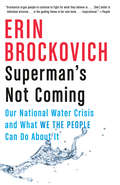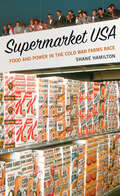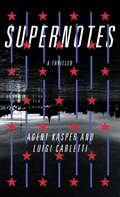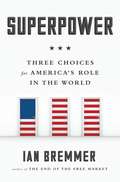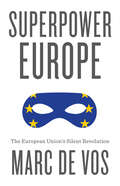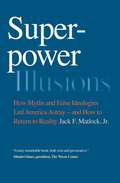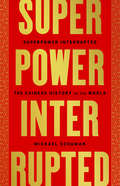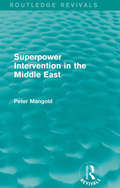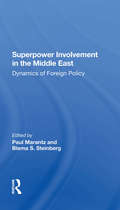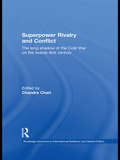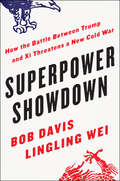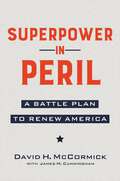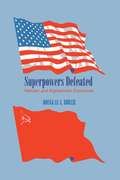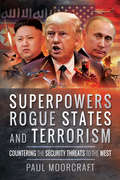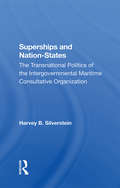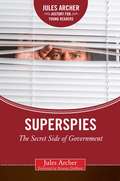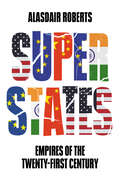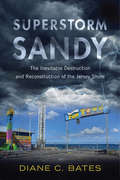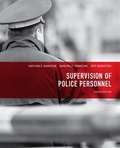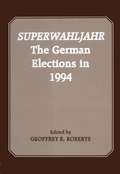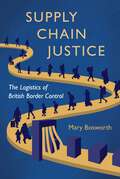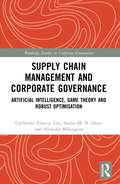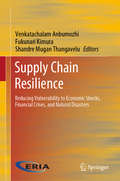- Table View
- List View
Superman's Not Coming: Our National Water Crisis and What We the People Can Do About It
by Erin BrockovichFrom the environmental activist, consumer advocate, renowned crusader, and champion fighter whose courageous case against Pacific Gas and Electric was dramatized in the Oscar-winning film—a book to inspire change that looks at our present situation with water and reveals the imminent threats to our most precious, essential element as it shows us how, in large and practical ways, we can each take action to make changes in our cities, our towns, and our villages before it is too late. In Erin Brockovich&’s long-awaited book—her first to reckon with conditions on our planet—she makes clear why we are in the trouble we&’re in and warns us that if we&’re waiting for someone to save us, Superman isn&’t coming. Nor is the government or the environmental agencies. No one is going to solve this for us. It is up to us, we the people, and Brockovich shows us how. She shows us what&’s at stake (the average American uses nearly one hundred gallons of water each day, for everything from drinking to cooking to bathing), writing of the unreported cancer clusters, of plastic pollutants in our tap water (we produce more than three hundred million tons annually of plastic in the world, and half of all plastics created for disposable items such as water bottles), of the fraudulent science that disguises these issues. She identifies and describes the most toxic chemicals in everyday products, from shampoos and baby lotions to cell phones and Tupperware, with only a few hundred under regulation, among them asbestos, lead, mercury, radon, and formaldehyde. She describes the saga of PG&E that continues to this day, and how her work in Hinckley, California, far from being a oneoff situation, opened up a rabbit hole bigger than anyone could have imagined, leading Brockovich to all of our backyards. We see the communities and people with whom she has worked and who have helped to make an impact: the water operator in Poughkeepsie, New York, who changed his system to create some of the safest water in the country; the moms in Hannibal, Missouri, who became the first citizens in the nation to file an ordinance prohibiting the use of ammonia in their public drinking water; the woman in Tonganoxie (Tongie), Kansas, who fought to keep a massive, $320 million Tyson chicken processing complex out of her town (population: 5,300). Throughout, Brockovich, ever inspiring, empowers us, urging us to act on what we know is right: to ask questions, to scrutinize our water professionals; showing us ways to protect our health, our families, and our lives; to storm our city halls, to use local media, town hall meetings, etc., until our water is safe for everyone to drink. Whether we have PhDs, or degrees in science or in law; whether we&’re politicians, or government or agency officials, Brockovich shows us how we can each take baby steps to make a difference that can, and will, and must change the world.
Supermarket USA: Food and Power in the Cold War Farms Race
by Shane HamiltonThis cultural history examines the global rise of American-style supermarkets during the Cold War era and how they shaped the way we eat today.Supermarkets were invented in the United States, and from the 1940s on they made their way around the world, often explicitly to carry American-style economic culture with them. This innovative history tells us how supermarkets were used as anticommunist weapons during the Cold War, and how their proliferation has shaped our current food system.The widespread appeal of supermarkets contributed to a “farms race” between the United States and the Soviet Union, as the superpowers vied to show that their contrasting approaches to food production and distribution were best suited to an abundant future. In the aftermath of the Cold War, US food power was transformed into a global system of market power, laying the groundwork for the emergence of our contemporary world, in which transnational supermarkets operate as powerful institutions in a global food economy.
Supernotes
by John Cullen Luigi Carletti Agent KasperIn the Cambodian hinterlands, a lone Western prisoner suffers through a hot, muddy, interminable sentence. Wasted by repeated torture, lack of sleep, malnutrition, and psychotropic drugs, he has been abandoned. His years of exemplary service to his government mean nothing. No one is coming for him.This is Agent Kasper, a man with a staggering résumé: commercial airline pilot, firearms expert, highly accomplished practitioner of several of the martial arts, a secret agent par excellence. It is this incredible competence that will be his undoing. While investigating Mafia money laundering in Phnom Penh, Kasper is approached by the CIA to track down the source of the so-called supernotes--illegal U.S. banknotes counterfeited so perfectly that they are undetectable, even by sophisticated machines--that are flooding Southeast Asia. With patience, skill, and courage, Kasper uncovers the explosive secret behind them and is badly burned by the truth.Meanwhile, back in Rome, a sharp, scrappy lawyer named Barbara Belli has been hired by Kasper's family to work for his release. She has contacts in the foreign ministry, and while officials make sweeping claims about moving heaven and earth, nothing happens. It's more than just creaking bureaucracy. Kasper has really pissed off the wrong people.Based on true events in the life of a former spy, Kasper's journey makes for a shocking and spellbinding page-turner of petty corruption, high-level betrayal, and state secrets so powerful that governments will protect them by any means.From the Hardcover edition.
Superpower
by Ian BremmerAmerica will remain the world's only superpower for the foreseeable future. But what sort of superpower? What role should America play in the world? What role do you want America to play? Ian Bremmer argues that Washington's directionless foreign policy has become prohibitively expensive and increasingly dangerous. Since the end of the Cold War, U.S. policymakers have stumbled from crisis to crisis in Afghanistan, Iraq, Iran, Libya, Syria, and Ukraine without a clear strategy. Ordinary Americans too often base their foreign policy choices on allegiance or opposition to the party in power. We can no longer afford this complacency, especially now that both parties are deeply divided about America's role in the world. The next presidential election could easily pit an interventionist Democrat against an isolationist Republican--or the exact opposite. As 2016 rapidly approaches, Bremmer urges every American to think more deeply about what sort of country America should be and how it should use its superpower status. He explores three options: Independent America asserts that it's time for America to declare independence from the responsibility to solve other people's problems. Instead, Americans should lead by example--in part, by investing in the country's vast untapped potential. Moneyball America acknowledges that Washington can't meet every international challenge. With a clear-eyed assessment of U.S. strengths and limitations, we must look beyond empty arguments over exceptionalism and American values. The priorities must be to focus on opportunities and to defend U.S. interests where they're threatened. Indispensable America argues that only America can defend the values on which global stability increasingly depends. In today's interdependent, hyperconnected world, a turn inward would undermine America's own security and prosperity. We will never live in a stable world while others are denied their most basic freedoms--from China to Russia to the Middle East and beyond.There are sound arguments for and against each of these choices, but we must choose. Washington can no longer improvise a foreign policy without a lasting commitment to a coherent strategy. As Bremmer notes, "When I began writing this book, I didn't know which of these three choices I would favor. It's easy to be swayed by pundits and politicians with a story to sell or an ax to grind. My attempt to make the most honest and forceful case I could make for each of these three arguments helped me understand what I believe and why I believe it. I hope it will do the same for you. I don't ask you to agree with me. I ask only that you choose."From the Hardcover edition.
Superpower Europe: The European Union's Silent Revolution
by Marc De VosThe European Union is in a state of revolution. In response to new global realities from the climate crisis to the Covid-19 pandemic, the war in Ukraine to the emerging cold war with China, the EU is transforming into a federal superpower in a new world order. In this timely intervention, Marc De Vos gets to the heart of the challenges facing the European Union as it undergoes this silent revolution. Charting its changing mission and identity from a European community into a geostrategic coalition of Eurasian countries; from a union of values into a union of power; and from a market project into a state project, he exposes what’s at stake for both the EU itself and its partners across the world. But retaining this new superpower status, he cautions, is not a given. The European Union’s de facto metamorphosis must mature into a democratic political structure or it risks a crisis of legitimacy that could ultimately threaten the stability of the European Union itself.
Superpower Illusions: How Myths and False Ideologies Led America Astray—and How to Return to Reality
by Jack F. Matlock Jr.&“This persuasive, occasionally provocative book corrects a number of pervasive myths about the Cold War&”—from the former U.S. ambassador to the USSR (Publishers Weekly).In Superpower Illusions, Jack F. Matlock refutes the enduring idea that the United States forced the collapse of the Soviet Union by applying military and economic pressure—with wide-ranging implications for U.S. foreign policy. Matlock argues that Gorbachev, not Reagan, undermined Communist Party rule in the Soviet Union and that the Cold War ended in a negotiated settlement that benefited both sides. He posits that the end of the Cold War diminished rather than enhanced American power; with the removal of the Soviet threat, allies were less willing to accept American protection and leadership that seemed increasingly to ignore their interests.Matlock shows how, during the Clinton and particularly the Bush-Cheney administrations, the belief that the United States had defeated the Soviet Union led to a conviction that it did not need allies, international organizations, or diplomacy, but could dominate and change the world by using its military power unilaterally. Superpower Illusions is &“a truly remarkable book, both wise and provocative, telling a sad yet instructive story of how the United States failed to exploit a triumph in the Cold War to build a new international order reflecting U.S. interests and principles&” (Dimitri Simes, President and CEO, The Center for the National Interest).&“A well written, clearly reasoned and thoroughly informed tour of the past half century of American diplomacy—including the roots of its successes and failures—led by a superbly qualified participant. A brilliant book.&”—Sidney Drell, Stanford University
Superpower Interrupted: The Chinese History of the World
by Michael SchumanThis history of China as the Chinese would write it gives brilliant and unconventional insights for understanding China's role in the world, especially the drive to "Make China Great Again." We in the West routinely ask: "What does China want?" The answer is quite simple: the superpower status it always had, but briefly lost. In this colorful, informative story filled with fascinating characters, epic battles, influential thinkers, and decisive moments, we come to understand how the Chinese view their own history and how its narrative is distinctly different from that of Western civilization. More important, we come to see how this unique Chinese history of the world shapes China's economic policy, attitude toward the United States and the rest of the world, relations with its neighbors, positions on democracy and human rights, and notions of good government.As the Chinese see it, for as far back as anyone can remember, China had the richest economy, the strongest military, and the most advanced philosophy, culture, and technology. The collision with the West knocked China's historical narrative off course for the first time, as its 5,000-year reign as an unrivaled superpower came to an ignominious end. Ever since, the Chinese have licked their wounds and fixated on returning their country to its former greatness, restoring the Chinese version of its place in the world as they had always known it. For the Chinese, the question was never if they could reclaim their former dominant position in the world, but when.
Superpower Intervention in the Middle East (Routledge Revivals)
by Peter MangoldStrategically placed on the global chess board, as well as controlling vast oil resources, the Middle East was one of the main theatres of Cold War. In the 1950s the Soviet Union had taken advantage of Arab Nationalists’ disillusion with British and French Imperialism, along with the emerging Arab-Israeli conflict, to establish relations with Egypt, Syria and Iraq. The United States responded by moving in to shore up the Western position. Confrontation was inevitable. Superpower Intervention in the Middle East was written in 1978, when this confrontation was at its height. The book’s main theme focuses on how the superpowers became competitively involved in local Middle East conflicts over which they could exercise only limited control, and the risks of nuclear confrontation of the kind which occurred at the end of the 1973 Arab-Israeli war. The threat to Western oil supplies is also examined. This is a fascinating work, of great relevance to scholars and students of Middle Eastern history and political diplomacy, as well as those with an interest in the relationship between the Western superpowers and this volatile region.
Superpower Involvement In The Middle East: Dynamics Of Foreign Policy
by Shmuel Sandler Paul Marantz Blema Steinberg John SiglerThe contributors to this book offer an explanation of Soviet and U.S. policy in the Middle East by exploring how the superpowers define their goals in the region, the factors that both stimulate and constrain the United States and the Soviet Union in the implementation of their objectives, and how their mutual perceptions influence behavior. The ch
Superpower Rivalry and Conflict: The Long Shadow of the Cold War on the 21st Century (Routledge Advances in International Relations and Global Politics)
by Chandra ChariVariously described by historians and thinkers as the ‘most terrible century in Western history’, ‘a century of massacres and wars’ and the ‘most violent century in human history’, the 20th century – and in particular the period between the First World War and the collapse of the USSR – forms a coherent historical period which changed the entire face of human history within a few decades. This book examines the trajectory of the Cold War and the fallouts for the rest of the world to seek lessons for the 21st century to manage international relations today and avoid conflict. Written by experts in their field, the chapters provide an alternative perspective to the Western-paradigm dominated international relations theory. The book examines for example whether now in the 21st century the unipolar moment has passed and if the changing economic balance of power, thrown up by globalization, has led to the emergence of a multipolar world capable of economic and multilateral cooperation. It discusses the potential of new cooperative security frameworks, which would provide an impetus to disarmament and protection of the environment globally and asks if nuclear disarmament is feasible and necessary. The book highlights areas in which the potential for conflict is ingrained. Offering Asian perspectives on these issues – perspectives from countries like Afganistan, Vietnam, West Asia and Pakistan which were embroiled in the Cold War as mere pawns and which have become flashpoints for conflict in our century – this book is an important contribution to the ongoing debate.
Superpower Showdown: How the Battle Between Trump and Xi Threatens a New Cold War
by Bob Davis Lingling WeiThe inside story of the US–China trade war, “especially insightful on how the contradictory natures of Trump and Xi have impeded understanding” (The Boston Globe).This book reveals how relations between China and the United States unraveled, darkening prospects for global peace and prosperity, told by two Wall Street Journal reporters—one a Pulitzer Prize winner based in Washington, DC, the other in Beijing—who have had more access to the decision makers in the White House and in China’s Zhongnanhai leadership compound than anyone else.The trade battle between China and the US didn’t start with Trump and won’t end with him, argue Bob Davis and Lingling Wei. The countries have a long and fraught political and economic history, which has become more contentious in recent years—an escalation that has negatively impacted both countries’ economies and the world at large—and holds the potential for even more uncertainty and disruption.How did this standoff happen? How much are US presidents and officials who haven’t effectively confronted or negotiated with China to blame? What role have Chinese leaders, and US business leaders who for decades acted as Beijing’s lobbyists in Washington, played in driving these tensions? Superpower Showdown is the story of a romance gone bad, based on the authors’ hundreds of interviews with government and business officials in both nations over seven years. They explain how we reached this tipping point—and look at where we could be headed. “Essential reading for anyone concerned about America’s economic future.” —Publishers Weekly (starred review)"A must-read for anyone interested in what happened between China and the United States, likely the world’s most important economic relationship.” —Forbes
Superpower in Peril: A Battle Plan to Renew America
by David McCormickDiscover a groundbreaking vision for how to unlock America&’s full potential for greatness from one of the country&’s foremost conservative leaders: David McCormick, the former CEO of Bridgewater Associates. It&’s easy to be pessimistic about the state of our country these days, but as McCormick explains, if the true test of a great country is its capacity for self-renewal, the United States of America stands apart. Our country has continually defeated grave threats and overcome domestic divisions when the odds have been stacked against us. That&’s the American story, and we can do it again. Drawing on decades of leadership in business, the military, and government, McCormick issues a call for visionary, servant leadership and outlines a conservative agenda for American renewal that would expand access to the American Dream, ensure U.S. technological supremacy, confront China, and revive the restless, courageous, and indefatigable spirit that dwells within the American heart. This book is a must read for those who care deeply about the future of America. McCormick, a former candidate for the U.S. Senate in Pennsylvania in 2022, argues the path forward is treacherous and uncertain. It will undoubtedly test our resilience and place in the world. But if we commit ourselves to renewal, America's best days are yet to come.
Superpower: Three Choices for America's Role in the World
by Ian BremmerAmerica will remain the world's only superpower for the foreseeable future. But what sort of superpower? What role should America play in the world? What role do you want America to play? Ian Bremmer argues that Washington's directionless foreign policy has become prohibitively expensive and increasingly dangerous. Since the end of the Cold War, U.S. policymakers have stumbled from crisis to crisis in Afghanistan, Iraq, Iran, Libya, Syria, and Ukraine without a clear strategy. Ordinary Americans too often base their foreign policy choices on allegiance or opposition to the party in power. We can no longer afford this complacency, especially now that both parties are deeply divided about America's role in the world. The next presidential election could easily pit an interventionist Democrat against an isolationist Republican--or the exact opposite. As 2016 rapidly approaches, Bremmer urges every American to think more deeply about what sort of country America should be and how it should use its superpower status. He explores three options: Independent America asserts that it's time for America to declare independence from the responsibility to solve other people's problems. Instead, Americans should lead by example--in part, by investing in the country's vast untapped potential. Moneyball America acknowledges that Washington can't meet every international challenge. With a clear-eyed assessment of U.S. strengths and limitations, we must look beyond empty arguments over exceptionalism and American values. The priorities must be to focus on opportunities and to defend U.S. interests where they're threatened. Indispensable America argues that only America can defend the values on which global stability increasingly depends. In today's interdependent, hyperconnected world, a turn inward would undermine America's own security and prosperity. We will never live in a stable world while others are denied their most basic freedoms--from China to Russia to the Middle East and beyond.There are sound arguments for and against each of these choices, but we must choose. Washington can no longer improvise a foreign policy without a lasting commitment to a coherent strategy. As Bremmer notes, "When I began writing this book, I didn't know which of these three choices I would favor. It's easy to be swayed by pundits and politicians with a story to sell or an ax to grind. My attempt to make the most honest and forceful case I could make for each of these three arguments helped me understand what I believe and why I believe it. I hope it will do the same for you. I don't ask you to agree with me. I ask only that you choose."
Superpowers Defeated: Vietnam and Afghanistan Compared
by Douglas A. BorerDuring the Cold War, military conflicts in Vietnam and Afghanistan validated the importanct of war in global power dynamics. But military intervention proved not to be politically sustainable for the USA and the USSR. This study investigates the parallels and differences in the two conflicts.
Superpowers, Rogue States and Terrorism: Countering the Security Threats to the West
by Paul MoorcraftNumerous books have attempted to assess the generational threat from Jihadist-inspired terrorism but few offer any positive advice on solutions. Islamist terrorism is today a fact of life and its potency is vividly illustrated by outrages in otherwise secure Western democracies not to mention overt ISIL aggression in the Middle East and many African States. Without a far better understanding of the Islamic religion, its beliefs, value, hierarchy (or lack of) and different sects, countering the existential threat will be greatly hindered, not to say nearly impossible. In this thoughtful book the author, who combines scholarship with gritty on-the-ground experience, examines numerous options to counter the insidious threat that faces not only Western civilization but the wider world. These range from the extremes such as deportation and internment, through the multifaceted combined actions against hate preachers, intensified intelligence work and border security to comprehensive and inclusive joint action programs. This is an important and timely book on what is today the greatest security threat, written by an acknowledged expert.
Superships And Nationstates: The Transnational Politics Of The Intergovernmental Maritime Consultative Organization
by Harvey B SilversteinWith the explosion of national, international, and multinational actors becoming involved in ocean exploitation, concern has arisen over how this common resource is to be managed. One focus of these concerns has been with those international organizations already involved in ocean issues. The subject of this book is one of those international organizations, the Intergovernmental Maritime Consultative Organization (IMCO) and how it operates. The tasks and functioning of IMCO have not only been neglected by observers of international organization, but are unknown to many of those individuals specifically concerned with the operation of the1Specialized Agencies of the United Nations system.
Superspies: The Secret Side of Government
by Jules Archer Brianna DuMontAnyone who has ever participated in a demonstration, gone to a rally, or even written a term paper on a subject remotely “un-American,” you may have been watched. Whether they’ve helped organize a union or engaged in anti-labor activities, there is a chance that your phone may be tapped or your mail opened. There may be a file about you at the FBI. Currently, a very delicate balance exists between surveillance in the name of national security and spying. An upset in this balance can result in a threat to civil liberties. The growth of huge bureaucracies of superspies on the federal, state, and local levels has tipped this balance to jeopardize the right to privacy. The CIA, the FBI, virtually every government agency, and numerous corporations have stretched “spying in the public interest” to its limits. Foreign governments are toppled, assassinations are plotted. The consequences of political dissent are enormous.
Superstates: Empires of the Twenty-First Century
by Alasdair RobertsIn this century, the world will conduct an extraordinary experiment in government. In 2050, forty percent of the planet's population will live in just four places: India, China, the European Union, and the United States. These are superstates – polities that are distinguished from normal countries by expansiveness, population, diversity, and complexity. How should superstates be governed? What must their leaders do to hold these immense polities together in the face of extraordinary strains and shocks? Alasdair Roberts looks to history for answers. Superstates, he contends, wrestle with the same problems of leadership, control, and purpose that plagued empires for centuries. But they also bear heavier burdens than empires – including the obligation to improve life for ordinary people and respect human rights. One axiom of history was that empires always died. Size and complexity led to fragility, and imperial rulers improvised constantly to put off the day of reckoning. Leaders of superstates are doing the same today, pursuing radically different strategies for governing at scale that have profound implications for democracy and human rights. History shows that there are ways to govern these sprawling and diverse polities well. But this requires a different way of thinking about the art and methods of statecraft.
Superstition as Ideology in Iranian Politics
by Ali RahnemaA superstitious reading of the world based on religion may be harmless at a private level, yet employed as a political tool it can have more sinister implications. As this fascinating book by Ali Rahnema, a distinguished Iranian intellectual, relates, superstition and mystical beliefs have endured and influenced ideology and political strategy in Iran from the founding of the Safavid dynasty in the sixteenth century to the present day. As Rahnema demonstrates through a close reading of the Persian sources and with examples from contemporary Iranian politics, it is this supposed connectedness to the hidden world that has allowed leaders such as Muhammad Reza Shah Pahlavi and Mahmud Ahmadinejad to present themselves and their entourage as representatives of the divine, and their rivals as the embodiment of evil.
Superstorm Sandy
by Diane C. BatesSandy was the costliest hurricane in U.S. history after Katrina, but the waters had barely receded from the Jersey coast when massive efforts began to "Restore the Shore." Why do people build in areas open to repeated natural disasters? And why do they return to these areas in the wake of major devastation? Drawing on a variety of insights from environmental sociology, Superstorm Sandy answers these questions as it looks at both the unique character of the Jersey Shore and the more universal ways that humans relate to their environment. Diane C. Bates offers a wide-ranging look at the Jersey Shore both before and after Sandy, examining the many factors--such as cultural attachment, tourism revenues, and governmental regulation--that combined to create a highly vulnerable coastal region. She explains why the Shore is so important to New Jerseyans, acting as a key cultural touchstone in a state that lacks a central city or even a sports team to build a shared identity among the state's residents. She analyzes post-Sandy narratives about the Jersey Shore that trumpeted the dominance of human ingenuity over nature (such as the state's "Stronger than the Storm" advertising campaign) or proclaimed a therapeutic community ("Jersey Strong")--narratives rooted in emotion and iconography, waylaying any thought of the near-certainty of future storms. The book also examines local business owners, politicians, real estate developers, and residents who have vested interests in the region, explaining why the Shore was developed intensively prior to Sandy, and why restoration became an imperative in the post-storm period. Engagingly written and insightful, Superstorm Sandy highlights the elements that compounded the disaster on the Shore, providing a framework for understanding such catastrophes and preventing them in the future.
Supervision of Police Personnel (Eighth Edition)
by Nathan F. Iannone Marvin D. Iannone Jeff BernsteinThe must-read text for criminal justice students, prospective police supervisors, and police promotional exams. Supervision of Police Personnel, Eighth Edition, offers complete coverage of the principles and practices of police supervision for leadership training of supervisors in law enforcement and allied fields. This newly updated text explores relationships involved in individual and group management methods and the practical techniques for carrying out the various responsibilities of the police supervisor. Discussions focus on real issues faced by police supervisors in interpersonal, operational, and administrative relationships. Written by experienced police officers, the text presents time-tested content that is an indispensible resource for promotional exams.
Superwahljahr: The German Elections in 1994
by Geoffrey K. RobertsThe elections in 1994 in Germany gave rise to the word Superwahjahr (super-election year). In addition to the election of a new Bundestag in October, there was a presidential election, elections to the European Parliament and elections for seven Länder parliaments. This book provides a set of analyses of those elections, with emphasis on the Bundestag election.
Supply Chain Justice: The Logistics of British Border Control
by Mary BosworthHow the UK&’s immigration detention and deportation system turns people into monetized, measurable units on a supply chain In the UK&’s fully outsourced &“immigration detainee escorting system,&” private sector security employees detain, circulate and deport foreign national citizens. Run and organized like a supply chain, this system dehumanises those who are detained and deported, treating them as if they were packages to be moved from place to place and relying on poorly paid, minimally trained staff to do so. In Supply Chain Justice, Mary Bosworth offers the first empirically grounded, scholarly analysis of the British detention and deportation system. Drawing on four years of extensive ethnographic research, Bosworth examines what keeps the system in place and whether it might be effectively challenged.Told by a senior manager that &“this is a logistics business,&” Bosworth documents how the public and private sectors have built a supply chain in which people&’s humanity is transformed both symbolically and tangibly through administrative processes and bureaucracy into monetized, measurable units. Like all logistics, the system has failure built into it. The contract does not seek to eradicate risk but rather to manage it, determining responsibility and apportioning a financial value to such &“failures&” as delay, escape, aborted flight or death in custody. Front-line workers and managers depoliticise and normalise their efforts by casting their duties in familiar bureaucratic terms, with targets, &“service level agreements&” and &“key performance indicators.&” Focusing on first-hand accounts from workers and lengthy observation and document analysis, Bosworth explores the impact of border logistics in order to ask what it would take to build inclusive infrastructures rather than those designed to exclude.
Supply Chain Management and Corporate Governance: Artificial Intelligence, Game Theory and Robust Optimisation (Routledge Studies in Corporate Governance)
by Sardar M. Islam Catherine Xiaocui Lou Nicholas BillingtonSupply Chain Management and Corporate Governance: Artificial Intelligence, Game Theory and Robust Optimisation is the first innovative, comprehensive analysis and analytical robust optimisation modelling of the relationships between corporate governance principles and supply chain management for risk management and decision-making under uncertainty in supply chain operations. To avoid corporate failures and crises caused by agency problems and other external factors, effective corporate governance mechanisms are essential for efficient supply chain management. This book develops a new collaborative robust supply chain management and corporate governance (RSCMCG) model and framework that combines good corporate governance practices for risk management strategies and decision-making under uncertainty. This model is developed as a principal–agent game theory model, and it is digitalised and computed by Excel algorithms and spreadsheets as an artificial intelligence and machine-learning algorithm. The implementation of the RSCMCG model provides optimal supply chain solutions, corporate governance principles and risk management strategies for supporting the company to achieve long-term benefits in firm value and maximising shareholders’ interests and corporate performance while maintaining robustness in an uncertain environment. This book shows the latest state of knowledge on the topic and will be of interest to researchers, academics, practitioners, policymakers and advanced students in the areas of corporate governance, supply chain management, finance, strategy and risk management.
Supply Chain Resilience: Reducing Vulnerability to Economic Shocks, Financial Crises, and Natural Disasters
by Venkatachalam Anbumozhi Fukunari Kimura Shandre Mugan ThangaveluThis book investigates individual companies’ and industries’ supply chain risk management approaches to identify risk drivers and verify effective risk-reduction measures and business continuity plans.Typically, supply chain risk assessments focus on normative guidelines based on single best practice examples or vulnerability events, and there has been little work exploring how the concepts of supply chain risk management and resilience are related. However, since this relationship has implications for developing integrated response strategies, a clear understanding of the possible consequences is a fundamental step in building socio-economic resilience along the supply chain.Against this background, the book addresses three main topics: firstly, it defines the conceptual and sectoral domains of supply chain risk management and resilience by examining the welfare effects of extreme weather events and other economic shocks on selected global supply chains. It then presents an in-depth analysis of the scope of public–private partnerships to tackle the risks, by empirically exploring supply chain risk effects and information management. Thirdly, it proposes a regional cooperation framework in the context of major supply chain vulnerability events such as disasters and global financial crises.
